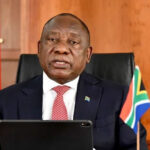The families of South African National Defence Force (SANDF) soldiers deployed in the Democratic Republic of Congo (DRC) are enduring sleepless nights, haunted by the sounds of machine gun fire in the background of voice recordings sent by their loved ones.
These chilling messages, shared with Daily Maverick, paint a picture of constant anguish and uncertainty, prompting desperate pleas for the government to bring the remaining soldiers home alive, rather than in body bags.
The bodies of the fallen soldiers were expected to be repatriated on Wednesday, 5 February, according to SANDF chief, General Rudzani Maphwanya, who addressed Parliament on Tuesday. Maphwanya, along with Defence Minister Angie Motshekga, briefed Members of Parliament (MPs) in the joint defence committee about the deaths and injuries sustained by South African soldiers during the recent fighting, which escalated on 23 January.

While Maphwanya did not provide specific details on the repatriation process or the negotiations involved, one of his officers indicated that the SANDF was working through the Southern African Development Community and the UN Monusco peacekeeping force. It's important to note that South African forces are deployed in both SAMIDRC and Monusco, adding complexity to the situation.
While a wife and one mother agreed to share their experiences with Daily Maverick, the mother of another soldier was reportedly too traumatised to speak, overwhelmed by grief and worry for her son's safety. One soldier, still stationed in Sake, declined to comment, citing a request from the SANDF for soldiers to refrain from communicating directly with the media.
'My Son is a Peacemaker': A Mother's Anguish
Caroline Kordom, the aunt of a 33-year-old soldier stranded in Sake, spoke to Daily Maverick on Wednesday, 5 February, expressing her deep anxieties and dissatisfaction with the government's handling of the situation. Kordom and her late mother, Carolina, had raised her nephew since he was eight years old. He completed his military training at the Oudtshoorn Military Base in 2013 and serves as a driver of a Ratel, an infantry battle vehicle. He is married to a soldier stationed in Upington, who has designated Kordom as the family spokesperson.

Kordom recounted that their ordeal began on 23 January, when she first learned about SANDF soldiers being shot in the DRC. She expressed frustration that the SANDF does not even inform wives about the situation in the DRC, or the dangers her husband is facing.
Tears welling in her eyes, Kordom said, "He’s more than just a nephew to me. I reared him as a son. My son is a peacemaker, not a fighter. The voice notes he sent, combined with the sound of machine guns in the background, continue to haunt me. It’s like a stuck record playing continuously."
She described the unsettling experience of listening to the voice notes, constantly fearing for her nephew's safety. "Listening to voice notes, the thought occurred to me that they were shooting at him. The bullets could have hit any of them. They were in the bunker bolstered with sandbags to determine who was shooting at them. If you heard the voice notes it was quite unsettling, because who is that bullet going to hit."
Kordom emphasised that the deadly skirmishes in the DRC were not something her nephew had been prepared for or informed about by the SANDF management. She recalled that years ago, he had participated in a UN-led peacekeeping mission in Sudan, where he drove an armoured truck and did not encounter any truly dangerous situations.

On Friday, 31 January, after she purchased international airtime for him, he shared the distressing news that SANDF troops were being forced to share their meals with the rebels, that the insurgents were among them, and that they were only receiving lunch or dinner. This revelation, she said, was enough to drive any mother or relative to despair.
"During our conversation on Sunday, 2 February he told me that when he returned home he didn’t want to leave this country again for any peacekeeping mission. He wasn’t aware of what was waiting on him in the DRC," Kordom said.

Uncertain about when the remaining 2,000 soldiers, including her nephew, will be brought home, Kordom warned that a failure to act swiftly could result in more soldiers returning in body bags.
At her nephew’s home in Upington, his wife has hung a fresh SANDF uniform on the cupboard door, a poignant symbol of hope and anticipation for his safe return.
A Family Decision: Deployment to the DRC
Josephine Smith, also from Saron, shared a different perspective, emphasising that the decision to deploy her husband to the DRC had been a carefully considered family decision, not a spontaneous one.
Her husband has served in the SANDF for nearly 29 years, and this is his fourth deployment to the DRC. "My husband was at the airport in Goma where they were attacked, but he escaped unscathed," she told Daily Maverick.
The Department of Defence confirmed that on Monday, 27 January, M23 rebels fired mortar bombs at Goma airport in eastern Congo, resulting in the deaths of three South African soldiers.
After Smith relayed Daily Maverick's request to speak to her husband, he sent a message on Tuesday stating that he did not want to comment at this stage because the attacks were not directed at them.
Smith explained that her husband has been in frequent communication with her since the conflict began, and she has kept the family and relatives informed.
"My husband’s deployment was a decision we made as a family. It took more than three years for us to feel comfortable with this decision. You must be mentally and physically ready to send your husband and wife," she said.
Smith highlighted the importance of preparation and counselling before deployment. "The psychologist and everyone prepare you for anything that may occur. It is something that you must consider before saying yes. You must prepare yourself for anything that may occur. A person does not want his or her mind to be involved in that, but you think and rely that everything will work out in the end and they will return safely," she explained.
Smith acknowledged the heartbreak caused by the deaths of the 14 troops, expressing her deep sympathy for their families. She said it was “unreal” how they coped.
Despite the uncertainty surrounding the return of the remaining soldiers, their families have established a WhatsApp group to share daily updates on the situation at the Goma and Sake camps. This platform serves as a vital source of information and support during this challenging time.
The accounts of these families offer a glimpse into the human cost of South Africa's involvement in the DRC.











